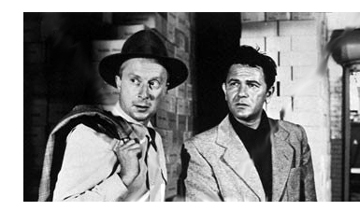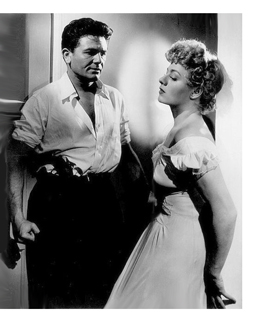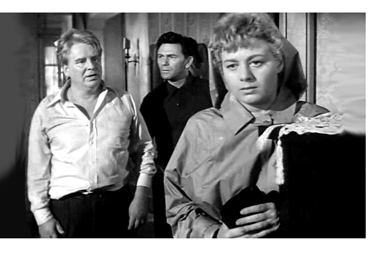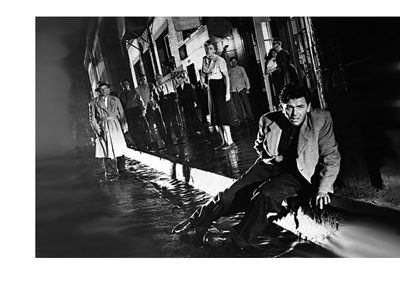
 |
|
|
|
By 1951 the blacklisting plague had permeated Hollywood and was working its way into the new TV industry in New York. The Hollywood Ten had long been hounded out of every kind of aboveground employment. More actors, writers and directors were being added to the Red Channels lists every week, placed there as they were denounced by other talent trying to save their own careers. Some top names fled this illegal government persecution before they could be subpoenaed. Things were even worse for those served with subpoenas but not called; some were caught in a limbo where they could not work. In many cases the State Department revoked their passports so they couldn't work overseas. Suspicion was treated as guilt, for an activity that was not a crime. 
John Berry had acted for the Mercury Theater, and after assisting Orson Welles was offered a directing job by producer John Houseman, in Hollywood. This turned into a successful if not stellar directing career for Berry, which included the superb noir film Tension with Richard Basehart and Audrey Totter. In 1950 Berry directed, and bravely put his name on the short film The Hollywood Ten, a defense of the writers and director cited with contempt of Congress for refusing to cooperate with the House Un-American Activities Committee. 1 By 1948 several unrepentant directors were making films that were more socially critical of America than ever -- Joseph Losey, Cy Endfield, Abraham Polonsky all made movies showing American business as corrupt, cynically suggesting that the capitalism was a rigged system. By 1951, actor John Garfield was being harried and harassed and threatened with blacklisting. His superb The Breaking Point was about a fishing boat operator 'forced' into crime by a supposedly unforgiving economic system. John Garfield's last movie is the even more pessimistic He Ran All the Way, directed with unrelenting tension by John Berry. The title could have been an epitaph for its star, for Garfield died of a heart attack less than a year later, aged all of 39 years. 
John Berry risked his own reputation raising public support for the Hollywood Ten. One of their number, director Edward Dmytryk, exiled to England, bought his way back into a Hollywood career by publicly recanting and naming names, among them John Berry. He Ran All the Way would be Berry's last Hollywood film for 23 years. So much for solidarity among those persecuted in the blacklist era. But how does the Garfield / Berry movie shape up? An independent production, it was made at a fraction of the cost of Garfield's studio films. After a first reel shot on location, the 'Guy Endore' screenplay stays largely in one set put together by designers Edward G. Boyle and Harry Horner (father of late film composer James Horner). Endore served as a front for the blacklisted Hugo Butler and Dalton Trumbo. That's quite a concentration of blacklisted talent.
Like other 'subversive' noirs, He Ran All the Way relates the criminal wrongdoing of individuals to perceived shortcomings in our society. Unemployed Nick Robey (Garfield) is easily swayed by his no-good associate Al Molin (Norman Lloyd) into pulling off a crude payroll robbery. A policeman kills Molin and Nick shoots him in order to escape. Panicked, Nick loses himself in the crowds of a public pool, and to avoid being on the streets picks up bather Peggy Dobbs (Shelley Winters). The naive Peggy is delighted to have an instant beau. She happily brings Nick home despite his nervous condition. Her father Fred, a printing press operator (Wallace Ford), her mother (Selena Royle) and her little
A lower class crook like Nick Robey should have a lot in common with Fred Dobbs' family, which subsists on modest means and shows every sign of sympathizing with his plight. But that potential for solidarity breaks down as Nick Robey's suspicion gets the better of him. On one level Nick is universally sympathetic. When we see his mother (Gladys George, floozius extremis), we find out that he grew up unloved and resented. He's a poster boy for the bad upbringing theory of delinquency. But most of the movie negates that interpretation. The naive Nick chooses to trust loathsome Al Molin's promises of an easy score. Had they walked calmly away from their crime they might have escaped, but Nick instead panics. He spends the rest of the film in an anxious fever, ruining any chance to escape. He repeatedly lashes out at Fred Dobbs, a truly harmless and likeable guy. Fred would be grateful for the opportunity to protect his family from harm, even if it meant looking the other way. But Nick doesn't give him a chance. In a telling speech, Fred reveals that the last thing he wants is to call in the cops. It's his experience that they act like firemen at a fire, chop chop chopping indiscriminately. 
Peggy's brother likes Nick at first, while her mother is not afraid to show her contempt for him. Shelley Winters' Peg is a nicely conceived foil for Nick. She's just an insecure kid flattered by Nick's attention, and continues to believe that he values her even after she finds out why he picked her up. She considers other directions but decides to back him. Even in his desperate state he needs her, and Peg feels that she needs him too. She's split between a hopeless commitment and a double cross. Without the aid of expository dialogue, Winters telegraphs the notion that perhaps the way to save her family is to bribe Nick with sex. Veteran Wallace Ford turns in one of his best performances as well, after his excellent role as a sleazy lawyer ("Let it happen, just let it happen!") in Garfield's previous The Breaking Point. Ford's ordinary Joe didn't ask for any of this grief. He doesn't want to hurt a fly, but when pushed too far is ready to sacrifice all to face down Nick. At one point in the night he sees Peg's dress spread out on a sofa, and we can sense his anguish as he thinks she has offered herself to the intruder. 
Nick's one-day career as a public enemy starts in a shack and has a finish like that reserved for a classic-era gangster. The ironic / iconic ending is good, but the character dynamics earlier on are terrific. Garfield already looks puffy and anxious, an appearance that is too easy to ascribe to his troubles with the witch hunters. He does well with the cruel dialogue, terrorizing the hapless Fords, and his star quality shines as strongly as ever. With Winters, on the other hand, everything is interior. Peggy Ford is just an ordinary girl, overwhelmed by an intolerable situation. She stands moping or feeling sorry for herself, but torrents of emotion seem to be warring within. Some viewers confuse He Ran All the Way with William Wyler's The Desperate Hours, another story of a family held hostage by criminals. But Wyler's film is intent on showing its upper-middle class family's superiority to the degenerate Humphrey Bogart and his lowborn crooks. The film is about the elimination of unworthy scum and the reinforcement of the status quo; it's not really a film noir at all. Butler, Trumbo, Garfield and Berry's picture stays in humble surroundings to show that trust and dignity are things that ordinary people can't afford. The picture reads like a liberal apology, but plays like a fated tragedy -- pure unadulterated noir. I don't suppose that the KL Studio Classics Blu-ray of He Ran All the Way is a special restoration, but it might as well be. The rich B&W image is much better than old 16mm prints I've seen, showing that James Wong Howe didn't need a big budget to create expressive images. Knowing that this is Garfield's final film adds to the tension -- the film seems energized by the collective outrage of its creative team. Yet they capture subtle dramatic situations that give the hostage story added breadth and substance. 
On a scale of Excellent, Good, Fair, and Poor, Footnote:
1. The surprisingly affecting film The Hollywood Ten is included as an extra on the Arrow Academy Blu-ray of The Naked City.

Reviews on the Savant main site have additional credits information and are often updated and annotated with reader input and graphics. T'was Ever Thus.
Review Staff | About DVD Talk | Newsletter Subscribe | Join DVD Talk Forum |
| ||||||||||||||||||